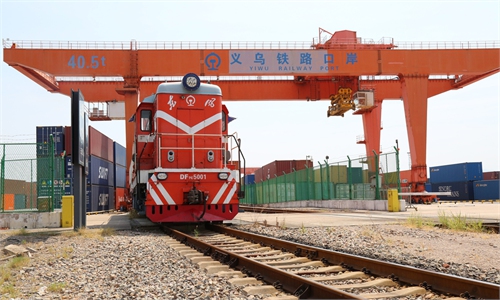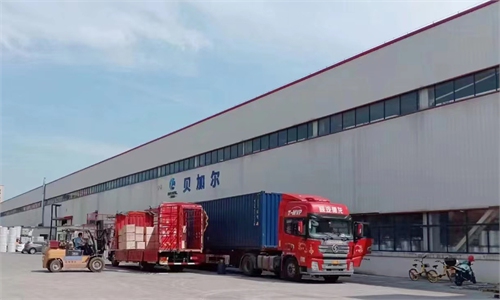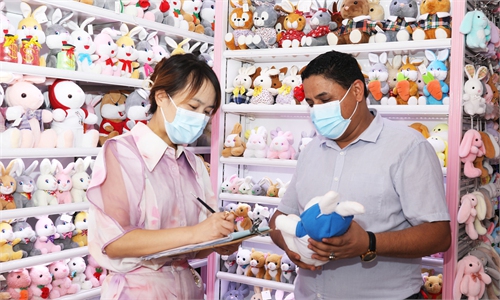‘Global supermarket’ Yiwu in E.China in full swing as Christmas orders boom
Mature industrial and supply chain puts the Chinese city in strong position: insiders
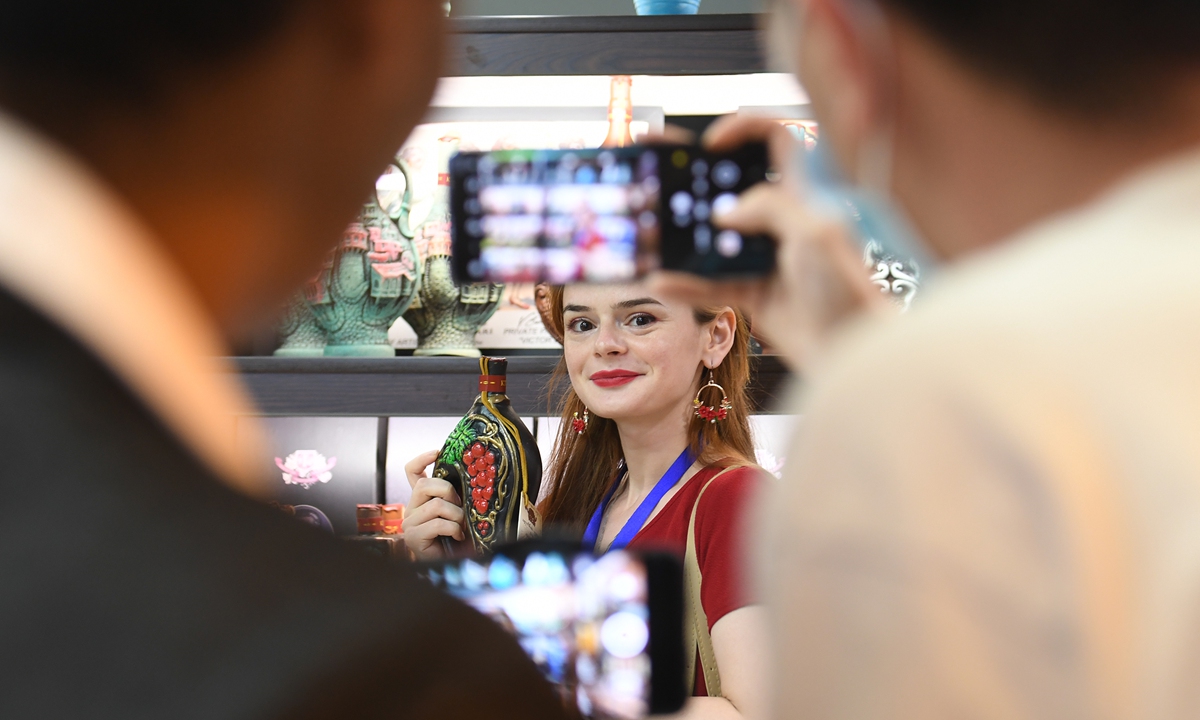
A student from Georgia shows merchandise in Yiwu, East China's Zhejiang Province. Photo: VCG
"Merry Christmas!" "Frohe Weihnachten!" "Joyeux noël!" "Feliz Navidad!" Stickers in various languages celebrating Christmas are seen on the walls at the Yiwu International Trade City, often dubbed a "global supermarket" of Christmas supplies, with Christmas trees, stockings, decorations and gifts seen everywhere.As Yiwu in East China's Zhejiang Province experienced a period of "static management" in August, which delayed some of the exports of Christmas goods, the whole city and local businesses are rushing to pack their products and deliver them by trucks, trains and container ships. July to September every year is the peak season for exports of Christmas products.
Since the pandemic leveled off in mid-August, factories have been running at full capacity to catch up with a backlog of orders.
'Work 24/7 to deliver goods'
"Production is basically over. Sales are good, and now our main task is to ship out our goods," a manager surnamed Zeng at an enterprise that manufactures Christmas ceramic decorations, told the Global Times on Tuesday.
A manager surnamed Liu at another Yiwu-based handicraft producer told the Global Times that more than 100 workers are now rushing to make 10 million Christmas balls, which were previously scheduled to be shipped to the US by the end of August. The order was made in June.
"Last year, many of our customers were unable to sell the Christmas products due to delayed arrival. Therefore, they pushed forward the procurement time for 3-6 months, but unfortunately we encountered an outbreak of infections in Yiwu in August," said Liu.
At the company's warehouse, Christmas products can be found neatly stacked. Liu said that the goods can fill more than 50 containers, which will be delivered to Singapore, France, Germany, Italy and other places. About 90 percent of the products will be delivered on schedule.
A Yiwu-based agent surnamed Wang who works in international logistics said that his warehouses in Yiwu have been filled with pallets of good waiting to depart.
"We have to work 24/7 to deliver all the goods. As soon as production and business activities resumed in mid-August, we began to receive goods from suppliers," said Wang.
Some goods will be transported to Yiwu train station, and will then be shipped to Ningbo-Zhoushan Port for sea shipping through the sea-rail intermodal transport. Some goods will be delivered by the China-Europe Railway. A small portion is simply transported by trucks, which is the fastest way for customers in Central Asia, the Middle East and Eastern Europe, according to Wang.
"North America and South America are far away, so the goods are shipped first. Christmas goods will mostly arrive at their destinations by mid-October," said Wang.
Cai Qinliang, secretary-general of the Industry Association of Christmas Supplies in Yiwu, told the Global Times that Yiwu's overall logistics system is smooth and there had been almost no impact on Christmas orders due to the epidemic.
"Everyone is busy packing and delivering, hoping their goods to reach buyers on time," said Cai.
Cai also said that Yiwu is the world's largest Christmas products distribution center. To regulate the healthy and orderly development of the industry, the association has set seven industry standards, including Christmas decoration supplies, Christmas hats, Christmas trees, Christmas clocks, Christmas flowers, Christmas wreaths and Christmas balls.
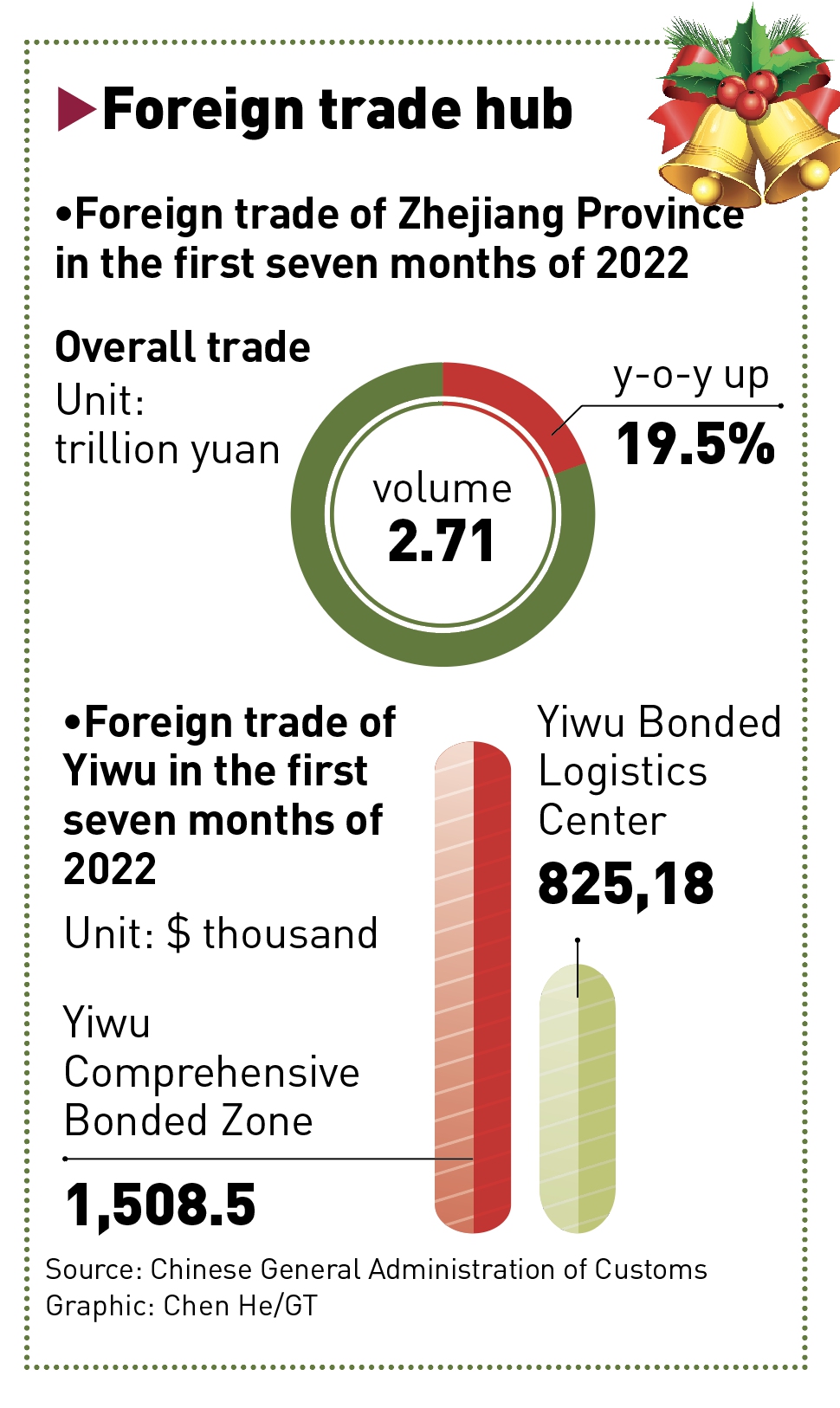
Graphic: Chen He/GT
Global market share of 80%
A lot of Christmas products are produced in Yiwu. The city exports more than 20,000 kinds of Christmas supplies to more than 100 countries and regions every year. Currently, there are more than 600 businesses specializing in Christmas products in Yiwu, statistics showed.
According to customs data, Yiwu's exports of Christmas products reached 1.75 billion yuan ($251 million) from January to July, with a year-on-year growth of 88.5 percent. The export volume in July alone was 850 million yuan, up 85.6 percent year-on-year.
Sales of Christmas products are as strong as ever. Factories have increased the artistic creativity and technological content which go into Christmas products, such as fiber optic Christmas trees with changing lights and Santa Claus ornament that can dance and sing, according to market analysis published on the website of Yiwu Small Commodity Index.
Zeng, the ceramic decoration manufacturer, said that they have designed and manufactured new ceramic decorations with more functions, such as a Santa Claus ornament that can be used as a bluetooth speaker box.
"Domestic manufacturers are also very juan, which means that your products have to be really competitive to stand out. We aim for high-added value items," said Zeng.
Zeng noted that Chinese manufacturers still dominate the Christmas ceramic decoration industry.
The competitiveness of China's industrial chain and supply chain is obvious, compared with other countries, industry insiders claimed, noting on a recent report by Bloomberg, which suggested that India has one of the top five suppliers of Christmas decorative items and T-shirts to the US, and is believed by many to have the potential to become the next China.
An anonymous veteran foreign trade agent told that Global Times that there it is difficult for India to replace China's leading position in export.
"India should first guarantee smooth and stable industrial and supply chain to be 'next China.' Chinese products are very attractive in price and quality. Domestic manufacturers are also upgrading their products to be more competitive," the agent said.
Even when additional tariffs were added to Chinese goods by the US, exports only saw limited impact, said the agent.
Artificial Christmas trees imported from Yiwu account for more than 80 percent of US' entire Christmas tree market, an industry insider told the Global Times.
And according to the Washington International Trade Association, some 80 percent of Americans observe Christmas with an artificial tree, and 98.3 percent of fake tree imports are from China.
